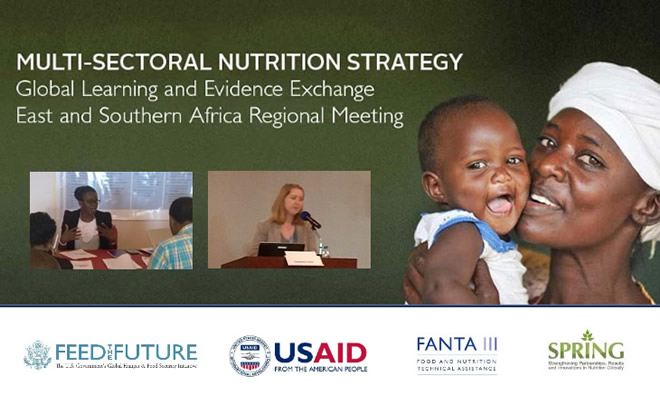
SPRING attended the East Africa Multi-Sectoral Nutrition Global Learning and Evidence Exchange (MSN-GLEE) in Dar-es-Salaam, Tanzania from March 8-10, 2016. The East Africa MSN-GLEE is one of four planned MSN-GLEEs through which USAID is rolling out and implementing their 2014–2025 Multi-Sectoral Nutrition Strategy, with support from SPRING and FANTA. Participants of the MSN-GLEE were drawn from USAID Missions, government offices, and non-governmental organizations from across 10 countries in East and Southern Africa. Two representatives from SPRING attended the MSN-GLEE: from SPRING’s Washington, D.C. office, Director of Global Initiatives Gwyneth Cotes, and from SPRING/Uganda, Technical Advisor for Anemia and Micronutrients Nancy Adero.
Ms. Cotes facilitated a session on country experiences in multi-sectoral nutrition programming where panelists highlighted experiences from Kenya, Rwanda, and Ethiopia on planning, implementing, and coordinating multi-sectoral programming. She also moderated the second day of the conference.
Ms. Adero led two round table sessions. The first session focused on SPRING’s Multi-Sectoral Anemia Platform Strengthening (MAPS) activity, centered on the steps involved in establishing a multi-sectoral anemia platform at the national level in Uganda. This session also introduced participants to SPRING's forthcoming District Assessment Tool for Anemia (DATA), a global tool that can be used across different contexts to help districts prioritize actions for anemia, and the Anemia Landscape Analysis guide, which will help programmers collect, synthesize, and interpret country-level information on anemia. In her second session, Ms. Adero shared the SPRING Nutrition Budget Analysis Tool and the findings of the Pathways to Better Nutrition study in Uganda.